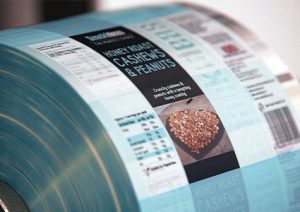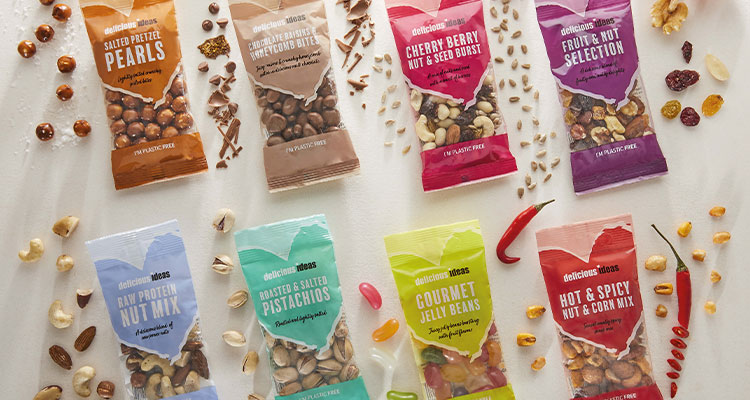Delicious Ideas Food Group lives up to its name
We last spoke to Delicious Ideas Food Group (DIFG) towards the end of 2021. It was a strange year; things were starting to slowly settle down into what many were dubbing the new normal, and with DIFG, it was no different.
There were highs and lows. For instance, DIFG was celebrating 30 years in business, but it was also dealing with the fallout from Covid-19, during which daily orders fell dramatically. Naturally, then, we were eager to sit down with Jonathan Potter, Co-Founder and CEO of the business, once more to see what’s changed two years on.
“Over the last 18 months or so, the business has continued to recover post-pandemic, along with the entire hospitality sector,” he begins. “Milestones such as launching a plastic-free snack pack range, retaining the British Retail Consortium’s ‘AA’ food safety accreditation and investing in a pouch-packing production line have supercharged the business into exceeding pre-Covid sales.”
Supply chain cohesion
DIFG, which specializes in a vast range of snacking products – from classic confectionary packs and nut bars to its recently-introduced selection of innovative drink brands – for various foodservice and hospitality clients, has achieved all this despite nascent challenges such as rising costs and inflation.

Jonathan explains further: “Just when we thought we’d negotiated pandemic-related challenges, the UK was hit with a staggering inflation crisis, which has been incredibly difficult to navigate. However, having a strong supply chain, built over the course of three decades, certainly helps.
“We’ve worked tirelessly with our manufacturers in both the UK and abroad to try and mitigate cost increases,” he goes on. “We’ve achieved this through various measures as well as being able to source alternative supply from new, emerging suppliers. There’s also been a real collaborative approach from our client buyers to agree on better pathways in terms of pricing to maintain the supply chain and its fluid movement.
“Also, through our co-packing division, we’ve worked on new product development to try and create value-added goods. In doing so, we’re offering consumers an alternative range of products to counter inflation on major brands.”
Though DIFG has maintained good supply chain relationships to keep the wheels in motion, it’s been a bumpy ride at times. “There’s been constant back and forth collaboration with our supply base on how we can keep price increases as low as possible,” admits Jonathan. “Indeed, larger volumes improve economies of scale, larger case sizes reduce distribution costs, increasing UK buying slashes shipping costs, and improving internal efficiencies helps everything run more smoothly. As I’ve said, though, having suppliers with us for more than 30 years has helped enormously in hard times – there’s a huge level of goodwill out there.”
Despite the challenging landscape, DIFG has used the less intensive period of production wisely. Assisted by the local government and Growth Works, the company has installed a new pouch-making machine, offering increased value for clients in a cost-of-living crisis.
Cutting carbon emissions
DIFG has also used the time to reflect on its processes and understand the business’ strengths and weaknesses in greater detail; for instance, it’s invested significantly in its marketing and has endeavored to connect more closely with clients and suppliers. “Our new, collaborative-based approach has reaped rewards over the past two years,” explains Jonathan.
“We’ve curated a reputation for being the main conveyor belt, as we might put it, for innovative, vibrant, and exciting new challenger brands in the foodservice channel. The key for success has without a doubt been the collaborative approach between all parties: client, distributor, and brand.”

Yet, now more than ever, it’s the issue of sustainability that’s coming to the fore of DIFG conversations. As Jonathan informs us, he believes the company must strategically choose brands that consumers will trust and buy into. “All we do then,” he says, “is provide the right logistics to take those products to market.”
In fact, last October, the business began its journey to become carbon-neutral. To achieve this, it began working with the University of East Anglia (UEA) and Eastern New Energy. Members of the DIFG team also took part in ‘Path to Zero Carbon’ in March of 2022, a course offered through the Eastern New Energy project.
Jonathan reflects on the event: “Led by the University of East London, and in partnership with the UEA, the project aimed to help businesses in the East of England become more energy efficient to cut both costs and carbon emissions. Following over 20 hours of learning, we were able to conduct an extensive audit on our 2022 carbon emissions.”
Sustainable snacking
DIFG was fortunate enough to be guided throughout the whole process by Robert Smith at the University of East Anglia, a distinguished expert in his field. “After calculating our carbon emissions for 2022,” Jonathan continues, “we purchased the necessary carbon credits with Carbon Neutral Britain to effectively become carbon neutral.
“In 2023, we will continue to monitor carbon emissions and energy usages across the business, setting new Key Performance Indicators (KPIs) to reduce emissions and become more environmentally friendly. Looking further down the line, we hope to reduce our scope three emissions (that is, those produced across our supply chain) and become net zero by 2050.”
Through the rest of the year, Jonathan expects DIFG’s sales to grow in volume, while at the same time onboard more staff at the family-owned business. “Further along, our plan is to keep growing and providing innovative drinks and snacking solutions to the hospitality and foodservice channels,” he concludes. “My fellow CEO, Emma Smith, and I will steer the ship with the help of our amazing employees, aiming to become the UK’s number one healthy drinks and snacking distributor.”
